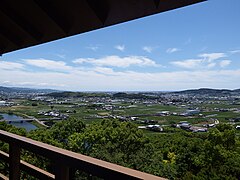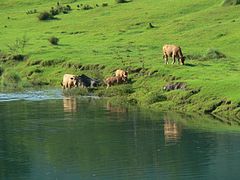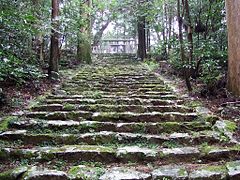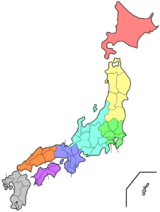Kōchi Prefecture
This article needs additional citations for verification. (October 2018) |
Kōchi Prefecture
| |
|---|---|
| Japanese transcription(s) | |
| • Japanese | |
| • Rōmaji | Kōchi-ken |
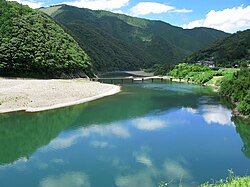 | |
| Anthem: Kōchi kenmin no uta | |
 | |
| Coordinates: 33°26′N 133°26′E / 33.433°N 133.433°E | |
| Country | |
| Region | Shikoku |
| Island | Shikoku |
| Capital | Kōchi |
| Subdivisions | Districts: 6, Municipalities: 34 |
| Government | |
| • Governor | Seiji Hamada |
| Area | |
| • Total | 7,103.93 km2 (2,742.84 sq mi) |
| • Rank | 18th |
| Population (April 1, 2023) | |
| • Total | 669,516 |
| • Rank | 45th |
| • Density | 106.68/km2 (276.3/sq mi) |
| GDP | |
| • Total | JP¥ 2,465 billion US$ 22.6 billion (2019) |
| ISO 3166 code | JP-39 |
| Website | www |
| Symbols of Japan | |
| Bird | Fairy pitta (Pitta nympha) |
| Flower | Yamamomo (Myrica rubra) |
| Tree | Yanase Sugi (Cryptomeria japonica) |
Kōchi Prefecture (
Kōchi is the capital and largest city of Kōchi Prefecture, with other major cities including Nankoku, Shimanto, and Kōnan.[3] Kōchi Prefecture is located on Japan's Pacific coast surrounding a large bay in the south of Shikoku, with the southernmost point of the island located at Cape Ashizuri in Tosashimizu. Kōchi Prefecture is home to Kōchi Castle, considered the most intact Japanese castle, and the Shimanto River, one of the few undammed rivers in Japan.
History[edit]
Kōchi Prefecture was historically known as Tosa Province and was controlled by the Chōsokabe clan in the Sengoku period and the Yamauchi clan during the Edo period.[4]
Kōchi city is also the birthplace of noted revolutionary Sakamoto Ryōma, who became one of the main instigators of the Meiji Restoration.
Geography[edit]
Kōchi Prefecture comprises the southwestern part of the island of Shikoku, facing the Pacific Ocean. It is bordered by Ehime to the north-west and Tokushima to the north-east. It is the largest but least populous of Shikoku's four prefectures. Most of the province is mountainous, and in only a few areas such as around Kōchi and Nakamura is there a coastal plain. Kōchi is famous for its many rivers. Inamura-yama in Tosa-cho is the highest peak in Kōchi prefecture with an altitude of 1,506 meters above sea level.
As of April 1, 2012, 7% of the total land area of the prefecture was designated as Natural Parks, namely the Ashizuri-Uwakai National Park; Ishizuchi, Muroto-Anan Kaigan, and Tsurugisan Quasi-National Parks; and eighteen Prefectural Natural Parks.[5]

City Town Village
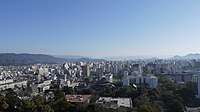

Cities[edit]
Eleven cities are located in Kōchi Prefecture:
| Flag | Name | Area (km2) | Population | Map | |
|---|---|---|---|---|---|
| Rōmaji | Kanji | ||||
 |
Aki | 317.34 | 17,810 | 
| |
 |
Kami | 537.95 | 26,526 | 
| |
 |
Kōchi (capital) | 309.22 | 319,077 | 
| |
 |
Kōnan | 126.75 | 32,786 | 
| |
 |
Muroto | 248.25 | 14,006 | 
| |
 |
Nankoku | 125.35 | 47,776 | 
| |
 |
Shimanto | 632.42 | 34,433 | 
| |
 |
Sukumo | 286.11 | 21,097 | 
| |
 |
Susaki | 135.46 | 22,508 | 
| |
 |
Tosa | 91.59 | 27,602 | 
| |
 |
Tosashimizu | 266.54 | 14,666 | 
| |
Towns and villages[edit]

These are the towns and villages in each district:
| Name | Area (km2) | Population | District | Type | Map | |
|---|---|---|---|---|---|---|
| Rōmaji | Kanji | |||||
| 39.63 | 3,846 | Aki District | Village | |||
| 44.88 | 4,896 | Takaoka District | Village | |||
| いの |
470.71 | 22,155 | Agawa District | Town | ||
| 196.18 | 1‚328 | Aki District | Village | |||
| 188.38 | 11,559 | Hata District | Town | |||
| 85.35 | 1,627 | Hata District | Village | |||
| 134.21 | 3,605 | Nagaoka District | Town | |||
| 28.32 | 3,359 | Aki District | Town | |||
| 193.19 | 7,156 | Takaoka District | Town | |||
| 332.96 | 5,676 | Agawa District | Town | |||
| 111.58 | 5,847 | Takaoka District | Town | |||
| 95.28 | 521 | Tosa District | Village | |||
| 314.94 | 4,950 | Nagaoka District | Town | |||
| 103.03 | 5,719 | Hata District | Town | |||
| 101.21 | 13,223 | Takaoka District | Town | |||
| 642.06 | 18,269 | Takaoka District | Town | |||
| 6.56 | 2,644 | Aki District | Town | |||
| 212.11 | 3,997 | Tosa District | Town | |||
| 74.09 | 2,598 | Aki District | Town | |||
| 197.85 | 5,680 | Takaoka District | Town | |||
| 165.48 | 737 | Aki District | Village | |||
| 53.03 | 2,614 | Aki District | Town | |||
| 236.51 | 3,640 | Takaoka District | Town | |||
Mergers[edit]
Tourism[edit]

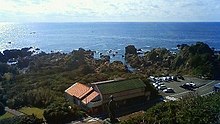

- Kōchi Castle, one of only 12 original castles left in Japan
- Aki Castle and samurai's residence district called Doi Kachū
- Okō Castle, Chōsokabe clan's prime castle ruins.
- Kōchi Prefectural Museum of History, Historical Museum located on Okō Castle
- Katsurahama
- Ryugado Cave, one of Japan's top three caves
- Shimanto River, the only undammed river in Japan
- Godaisan
- Anpanman Museum
- Muroto Schoolhouse Aquarium
Media[edit]
Various movies have been set in Kōchi. These include the following:
The 1993 Studio Ghibli movie Ocean Waves (Umi ga Kikoeru).
The 2009 movie The Harimaya Bridge starring Danny Glover.[6][7]
The 2013 movie Hospitality Department (Kencho Omotenashi Ka),[8] which shows views of Kōchi Prefecture.
The 2021 movie Belle (Ryū to Sobakasu no Hime).
Culture[edit]

Food[edit]
Like most areas of Japan, Kōchi advertises itself as specializing in a major food item, often known as meibutsu. Kōchi's is katsuo no tataki – skipjack tuna or bonito which is lightly seared.[9] Traditionally this is done over the straw generated as a by-product of the rice harvest.
Sawachi is a term which refers to "a style of meal" in Kochi prefecture, according to Kochi-City Tourism Association. It says that the characteristic of the style of eating is "its freeness in the arrangement of food on a large dish" People eat Sawachi in the situation of "Enkai" which refers to a gathering of family, friends and relatives. They surround "Sawachi", feasts on large dishes, and take own portions by themselves. The style represents the cultural climate of Kochi Prefecture, which dislikes formal arrangements and respects freedom.
Festival and events[edit]
- Festival
- Yosakoi Festival - Yosakoi (よさこい) is a unique style of dance that originated in Japan and that is performed at festivals and events all over the country.
Sports[edit]
The sports teams listed below are based in Kōchi.
- Baseball
- Football
See also[edit]
Notes[edit]
- ^ "2020
年度 国民 経済 計算 (2015年 基準 ・2008SNA) :経済 社会 総合 研究所 -内閣 府 ".内閣 府 ホームページ (in Japanese). Retrieved 2023-05-18. - ^ Nussbaum, Louis-Frédéric. (2005). "Kōchi prefecture" in Japan Encyclopedia, p. 538, p. 538, at Google Books.
- ^ Nussbaum, "Kōchi" at p. 538, p. 538, at Google Books.
- ^ Nussbaum, "Provinces and prefectures" at p. 780, p. 780, at Google Books.
- ^ "General overview of area figures for Natural Parks by prefecture" (PDF). Ministry of the Environment. Retrieved 19 August 2012.
- ^ Matt Alt; Hiroko Yoda; Melinda Joe (27 March 2012). Frommer's? Japan Day by Day. John Wiley & Sons. p. 532. ISBN 978-0-470-90826-6.
- ^ Iris-Aya Laemmerhirt (March 2014). Embracing Differences: Transnational Cultural Flows between Japan and the United States. transcript Verlag. p. 254. ISBN 978-3-8394-2600-5.
- ^ "Yukiyo Teramoto Makes Short Insert Anime for "Prefectural Office Hospitality Department: The Movie" - Tokyo Otaku Mode News". otakumode.com. May 2013.
- ^ Lafferty, Jefferey (2020-10-16). "Japan's delicious fire-seared delicacy". BBC.
References[edit]
- Nussbaum, Louis-Frédéric and Käthe Roth. (2005). Japan encyclopedia. Cambridge: Harvard University Press. ISBN 978-0-674-01753-5; OCLC 58053128
External links[edit]
![]() Media related to Kōchi prefecture at Wikimedia Commons
Media related to Kōchi prefecture at Wikimedia Commons
- Official website (in English)




